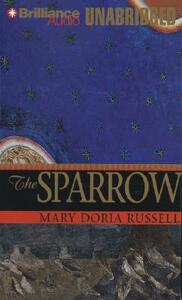You need to sign in or sign up before continuing.
Take a photo of a barcode or cover
challenging
dark
emotional
funny
hopeful
inspiring
reflective
sad
medium-paced
Plot or Character Driven:
A mix
Strong character development:
Yes
Loveable characters:
Yes
Diverse cast of characters:
Yes
Flaws of characters a main focus:
Complicated
I most disrespectfully return him the ticket
adventurous
reflective
medium-paced
Plot or Character Driven:
A mix
Loveable characters:
Yes
Writing about near-future space travel to an inhabited planet, Russell tells the story from the "present/future" in which the main character is looking back on what happened, at the same time developing the story from the "beginning." Characters are believable and there is a slightly horrific mystery behind a veil of storytelling.
A key component is "God" and the Jesuit priesthood. So be forewarned some of the theology is silly, but I didn't think it overpowered the novel-- in fact it gave it a dimension it probably needed. Some people might "get" the mystery too soon or think it's too plainly moralistic or pedantic. But I thought it was well done.
A key component is "God" and the Jesuit priesthood. So be forewarned some of the theology is silly, but I didn't think it overpowered the novel-- in fact it gave it a dimension it probably needed. Some people might "get" the mystery too soon or think it's too plainly moralistic or pedantic. But I thought it was well done.
I would consider this one of my all-time favorite books, and it has all my favorite elements: rich textured character development, a whole gambit of emotions from humor/levity to sadness/despair to spiritual joy, suspense that propels the reader forward desperate for more story, profound philosophical/mystical elements, and a whole fantastical worlds built up to explore (not only Rakhat, but also future Earth, La Perla, and the Jesuit society). I read this thinking it would have what I loved about Oscar Scott Card's Speaker for the Dead series (using alien contact to philosophize about ethics and morality, and using scifi genre to tell intensely relatable human stories), and it did not disappoint in any way.
Seriously, drop whatever you're reading and read this NOW.
Seriously, drop whatever you're reading and read this NOW.
I really enjoyed the first half of the book— considering the purpose of individual human lives, unexpected friendships and unrequited love, balancing faith and the fear that one is on a fool’s mission— all themes are right up my alley. However, I became critical and disappointed the moment the motley crew met the aliens on their planet. The “aliens” are essentially earth mammals that evolved to be sentient. They have a slightly stronger sense of smell. However everything else, from their human-like language in our audible wavelength and words, to their capitalist society and apparently similar sex organs, is distinctly Earthly and frequently human. Russels background as an anthropologist undoubtably influenced her creation of a society that is different from our own but she fails to imagine that the aliens are intrinsically, wildly different from any animals that have evolved on Earth. This lack of real difference frustrated me because of its utter unlikelihood.
I kept trying to remember that the aliens themselves aren’t the point of the book, but i found that the unbelievability of their existence to be a huge detractor. Furthermore, I think that their supposed “difference” is supposed to be a key factor in Russell’s themes of faith and purpose, and I just didn’t believe the difference was significant. The way the humans and aliens interacted approximated Jesuits meeting and learning about a native people’s society, not Jesuits meeting an entirely new, sentient species. Thus, even though I was intrigued by Russell’s themes and found the plot exciting and interesting, I was disappointed in the book as a whole.
I kept trying to remember that the aliens themselves aren’t the point of the book, but i found that the unbelievability of their existence to be a huge detractor. Furthermore, I think that their supposed “difference” is supposed to be a key factor in Russell’s themes of faith and purpose, and I just didn’t believe the difference was significant. The way the humans and aliens interacted approximated Jesuits meeting and learning about a native people’s society, not Jesuits meeting an entirely new, sentient species. Thus, even though I was intrigued by Russell’s themes and found the plot exciting and interesting, I was disappointed in the book as a whole.
dark
emotional
reflective
sad
slow-paced
Plot or Character Driven:
A mix
Strong character development:
Yes
Loveable characters:
Yes
Diverse cast of characters:
Yes
Flaws of characters a main focus:
No
:(
dark
mysterious
sad
medium-paced
Plot or Character Driven:
A mix
Strong character development:
Complicated
Loveable characters:
Yes
Diverse cast of characters:
Yes
Flaws of characters a main focus:
Complicated
The ending was honestly disappointing, and given the way the story was told, it was predictable (Emilio was obviously a victim of nonconsensual sexual violence, I’m not sure why everyone had to make him spell it out before they realized that… ) I expected the story to explore deeper themes about religion, culture, etc.
Graphic: Rape
I got to my 3 chapter limit, and I just wasn't vibing with this story. It reminded me of Radiance by Catherynne M. Valente, but I'd much rather re-read that instead
Read the description above. There is no doubt that it was written by Mary Doria Russell. The way it is subtlety well informed without reading like a textbook, almost funny without compromising its gravitas, and wholly engaging. The book is just the same way. Russell manages to make interstellar travel on papal authority seem feasible. The book is set in two temporal plains, which one might expect to be hard to follow. But the narrator, linguist Emilio Sandoz, is the sort of intelligent man of faith we all wish we could share a glass of wine with. He easily relates his experiences in an understandable way, while his companions Giuliani, Behr and Candotti relay the events of the of those left on Earth. Despite a complex time frame it is very readable. The themes are not simple, however. This is a novel that leaves you thinking. The coexistence of religion and science is an important theme as are questions of the maintenance of faith in the face of human fallibility. I highly recommend it and its sequel Children of God.



